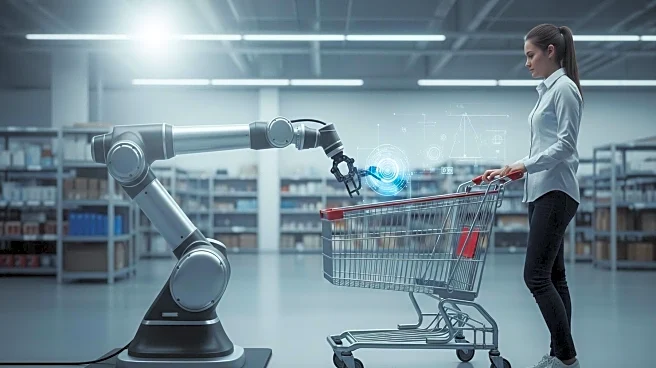What's Happening?
Walmart, the world's largest private employer with 2.1 million workers, is actively integrating artificial intelligence (AI) into its operations, a move that is expected to transform every job within the company. CEO Doug McMillon has stated that while AI will change the nature of work, there are no plans for sweeping layoffs. Instead, Walmart is focusing on equipping employees with the necessary tools and support to manage this transition. The company has already implemented automation in warehouses, reduced corporate jobs, and introduced new roles such as 'agent builders.' Additionally, AI chatbots are being deployed for customers, staff, and partners. This approach contrasts with other industry leaders who predict significant job losses due to AI. Walmart is emphasizing adaptation and reskilling, with a focus on a skills-over-degrees approach. The company has invested in training programs and plans to launch an AI certification program in partnership with OpenAI in 2026.
Why It's Important?
Walmart's strategy highlights a significant shift in how major corporations are approaching the integration of AI into their workforce. By focusing on reskilling and adaptation rather than layoffs, Walmart is setting a precedent for how businesses can manage technological disruption. This approach could influence other companies to adopt similar strategies, potentially mitigating the negative impact of automation on employment. The emphasis on skills over degrees also reflects broader changes in the job market, where practical skills are increasingly valued over formal education. For employees, this means new opportunities for growth and development, as well as the potential for more rewarding careers. For the retail industry, Walmart's actions could lead to a more skilled and adaptable workforce, capable of leveraging AI to enhance customer service and operational efficiency.
What's Next?
Walmart plans to continue its investment in employee training and development, with a focus on AI and technology skills. The upcoming AI certification program, set to launch in 2026, will be a key component of this strategy. As the company navigates this transition, it will likely monitor the impact of AI on its workforce and make adjustments as needed. Other businesses may watch Walmart's approach closely, potentially adopting similar strategies to manage their own transitions to AI-driven operations. The broader implications for the retail industry and the job market will depend on how effectively companies can balance technological advancement with workforce development.
Beyond the Headlines
Walmart's approach to AI integration raises important ethical and cultural questions about the future of work. By prioritizing reskilling and adaptation, the company is addressing concerns about job displacement and economic inequality. This strategy also highlights the importance of human skills in an increasingly automated world, suggesting that technology and people can coexist and complement each other. The long-term success of this approach will depend on how well companies can maintain a balance between technological innovation and human development, ensuring that employees are not left behind in the digital age.










